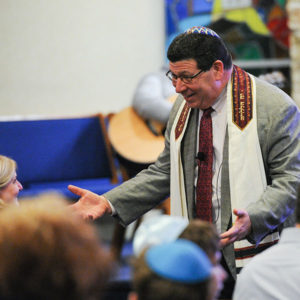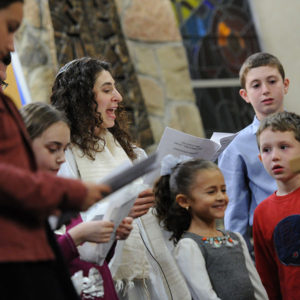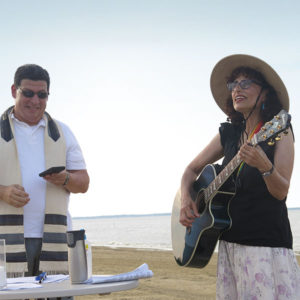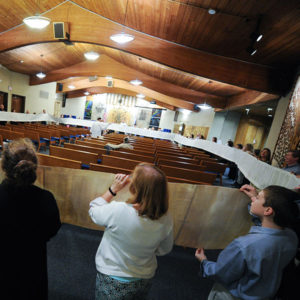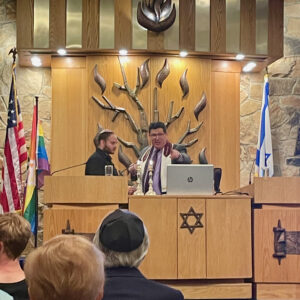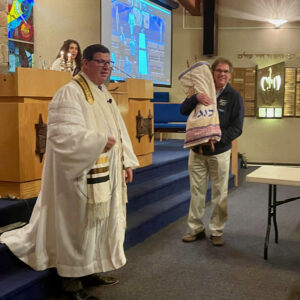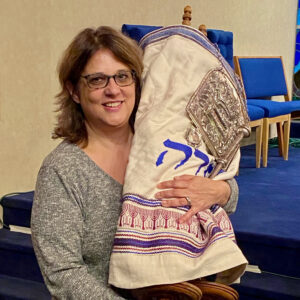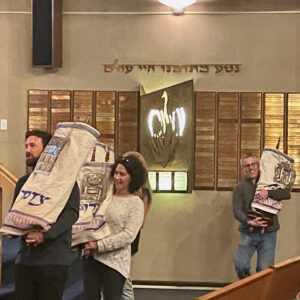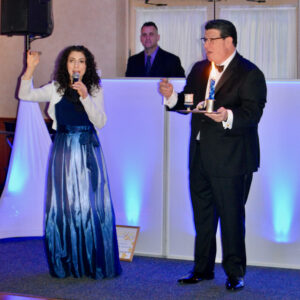Please Join Us
Prayer is a language that each of us speaks and hears in a different way. When we pray together, we try to find meaning within the chorus of diverse voices. With engaging sermons, stimulating teachings, and meaningful prayer intertwined with music, our clergy show us how the lessons from the past are relevant to our lives today.
Through a wide range of spiritual experiences we offer something for everyone, including weekly Shabbat evening and Shabbat morning services. In addition, special services are held throughout the year which include “Pray and Play,” “Shalom Yoga,” and so much more.
Our services are fully egalitarian (men and women participate equally). We believe we have found a healthy balance between the traditional and the creative. Services are a blend of Hebrew and English that helps everyone feel comfortable. Our prayer book, Mishkan T’filah, contains transliterations adjacent to all Hebrew prayers so that everyone, including guests, can participate easily and fully. We use both traditional and contemporary melodies. People who attend vary from those with traditional backgrounds to Jews by choice as well as guests of all faiths.
Schedule of Services:
Shabbat Evening Service
Erev Shabbat Services: Fridays, 7:30 pm (except the 1st Friday night of the month)
Kabbalat Shabbat Services: 1st Friday night of the month – 6:30 pmMorning Service
Saturdays
10:30 am, September - JuneHoliday Services & Special Events
Please see our Calendar for a full listing of services
Rock Shabbat Services
Check here for more information on our musical Shabbat services.
Rabbi's Most Recent Shabbat Greetings:
At the end of this week’s portion, Vayeshev (Genesis 37:1-40:23), Joseph is in jail and life looks hopeless. Yet we know that he will be released and become the second most powerful man in Egypt. As they say, “It is always darkest before the dawn.” Hanukkah always falls during the darkest time of the year (at least in the Northern Hemisphere) and wil begin next Wednesday evening, December 25th. Nonetheless, we know that light will push away the darkness. As we face these dark times, may our Hanukkah lights be a symbol of hope in the future.
Of course, Hanukkah celebrates a victory of Judah Maccabee and his brothers against the Syrian – Greeks. They had sought to prevent the people Israel from practicing their faith. With the victory, the Maccabees rededicated the Temple and began eight days of celebration. Each day we increase the number of candles, increasing the light. It is a powerful symbol of hope.
But is Judaism truly anti-Greek? I am a rabbi who studies and teaches from all sources and how each has influenced Jewish thought and behaviors today. One of the misconceptions that some have is how can I study other thoughts and philosophies when as a person of faith, sources for my beliefs are truths from revelation, sacred scripture, and properly ordained authority. Philosophy gets truth from open ended free debate. What could religion and philosophy have in common?
History has taught me that when early Church father Tertullian (155–220) famously said, “What has Athens to do with Jerusalem?” Athens is the birthplace of philosophy while Jerusalem is the center of religion. The two should have nothing to do with each other. Religion begins with faith while philosophy begins with arguments. How can I accept both? This is a valid question but my answer follows the approach of the great Christian thinker considered a saint by the Catholic Church, Anselm of Canterbury (1033–1109). Anselm invented the ontological proof for the existence of God, which philosophers still argue over to this day. He defined philosophy as “faith seeking understanding.” Such religious thinkers as the Muslim Avicenna, the Jewish Maimonides, and the Christian Thomas Aquinas begin with faith, and use philosophical arguments to deepen their faith. Personally, my study of secular philosophy has deepened my Jewish faith.
In fact, the Rabbis of the Talmudic period had a surprising respect for the Greek philosophical tradition. In the Talmud (Megillah 9b), the sage Rabban Shimon ben Gamliel allowed Torah scrolls to be written in Greek. He based this on the blessing in the Torah that Noah gives his sons. “God shall enlarge Japheth and he shall dwell in the tents of Shem” (Genesis 9:27). Japheth was the progenitor of Yavan, the Hebrew word for Greek. The Rabbis seem to read the verse from Genesis that the traditions of Greece shall enlighten the tent of the Hebrews.
Yes, we fought the Greeks. But we also learned from the Greeks. This raises a deep question – can someone be both our enemy and our teacher? It is a question worth pondering as we begin our celebration of Hanukkah. May the Festival of Lights shine brightly for all! (This week’s greetings was inspired by a lecture by Rabbi Michael Gold)
SHABBAT SHALOM
Keep Reading
